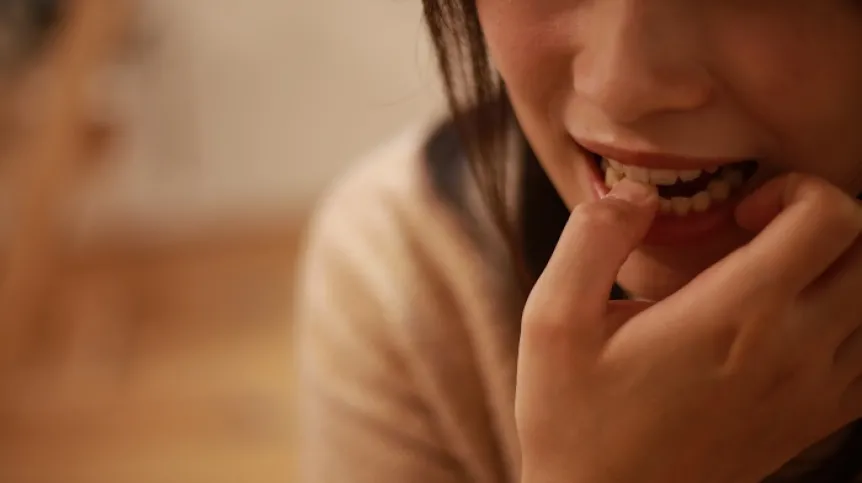
In people with misophonia, certain sounds - like munching or stomping - induce strong anger, disgust and anxiety. Aggression is common in children, self-harm in teenagers. 'Misophonia cannot be completely eliminated, but it can be weakened through therapy,’ says psychologist and psychotherapist Dr. Marta Siepsiak from the Faculty of Psychology of the University of Warsaw.
People with misophonia experience very strong emotions when they hear specific sounds, e.g. sounds of munching, slurping, footsteps, or typing. It usually concerns the sounds made by people, often related to eating. Misophonia affects approximately 5% of the population.
Dr. Siepsiak says that the sounds in question are unpleasant for most people. But only in some people these sounds trigger such violent emotions, cause suffering and significantly affect their lives. People with misophonia sometimes loudly express their expectations towards the environment - for example, they remind others not to make unpleasant sounds and to behave politely. However, some people with misophonia direct these emotions more at themselves: they feel guilty, they are afraid that they will not be able to bear it, that they will explode with anger. These are the people who seem to have higher symptoms of depression and anxiety.
'I decided to research misophonia because I suffer from it myself, just like some other leading misophonia researchers. And I know how much it can make life difficult,’ says Dr. Siepsiak.
The psychologist was recently awarded an American grant from the Misophonia Research Fund ($200,000) for research on the effectiveness of cognitive-behavioural psychotherapy for misophonia.
SOUNDS YOU CAN'T GET USED TO
'Everything indicates that misophonia - although it is not yet officially classified - should be treated as a separate disorder. We already know that it cannot be explained, for example, as a symptom of ADHD, PTSD, OCD, phobia or other anxiety disorders. There is also no scientific reason to interpret misophonic reactions as a hidden form of anger, e.g. at a parent. I am not aware of any cases of someone with misophonia making a recovery, although we do not have reliable data yet. However, it is possible to work on ensuring that it interferes with one's life as little as possible,’ Dr. Siepsiak says.
The psychologist has already conducted research on misophonia, also among children. Her research showed that most children with misophonia (7-12 years old) exhibit aggressive behaviour in response to an aversive sound, e.g. screaming, hitting, throwing things.
However, when it comes to teenagers (13-18 years old), aggression in response to sounds occurred in a small percentage of young people, but as many as half of the respondents self-harmed in response to sounds. This included pinching, scratching, biting, and hair pulling.
'I've heard from a parent that their child used to have misophonia, but doesn't have it anymore. And that is hardly possible. If it was indeed misophonia, it usually turns out that the child still has it, but it is expressed differently. Even though the person no longer screams at the surroundings in response to sound, they often still scream inside,’ she says.
While in therapeutic work on getting rid of phobias - e.g. concerning spiders, tight spaces - the best results are achieved by appropriate and safe exposure to the stimulus, classic habituation therapy will not work against misophonia. 'In some families they tell children or a partner with misophonia: +If you listen to it a lot, you will get used to it+. And we already know that the misophonic response will not disappear with exposure to a given sound. On the contrary - the more frequent the exposure to a given sound, without appropriate mental preparation and under stressful conditions, the worse it usually gets,’ Dr. Siepsiak says.
IS IT MUNCHING OR APPLAUSE?
In the case of misophonia it is not only the sound itself that matters, but also its context - how the person interprets the sound source. In previous research, Dr. Siepsiak has already checked whether people with misophonia react in the same way to an aversive sound if they misinterpret it. For example, clicking sounds were played in combination with a video showing hands slapping mud. In this changed context, although a misophonic response was still visible, people with misophonia responded to the hated sound with less tension. This shows that there is space for therapeutic work.
Consequently, under the new grant, the researcher will check how cognitive reinterpretation affects misophonia. Dr. Siepsiak, who is looking for adults with misophonia willing to participate in research, says: ’Cognitive reformulation consists in trying to read the sound in a different context than before, reformulate it.
‘As part of cognitive-behavioral therapy, psychologists, for example, look at a problematic situation with the patients from different perspectives. The idea is for the patient/client to identify a stressful situation and look at the thoughts and emotions that arise. Then you work on finding a new perspective on this matter. You can, for example, try to change the context of the sound in your head (e.g. realize that someone is not munching to annoy you), redirect your attention from the annoying sound to something else (e.g. your own breathing), imitate munching with your own facial expressions and. imagine it is your munching. The misophonic response will not disappear completely, but it can probably be weakened. This is indicated by several studies conducted in various centres around the world.
'I, too, am an example of that. What definitely helps me with misophonia is knowing what it is and how to deal with it. An interesting thing - when we intensively interview people with misophonia and I hear many difficult stories, the symptoms of my own misophonia increase for a while. However, if, for example, I look for aversive sounds for experiments - that is, I do not think about how badly someone munches, but I analyse the characteristics of the sounds - whether they are understandable, quiet, loud, sharp - my misophonia decreases. It helps if I change the context of the sound, redirect attention to other aspects of the sounds. This, of course, requires work, in everyday life this effect does not last very long in a given situation, and misophonia does not disappear, considering that it is impossible to get rid of misophonia - it makes life much easier.’
People with misophonia who would like to test the effectiveness of the solutions that Dr. Siepsiak and her team are working on can apply to participate in the study. All information regarding recruitment for the study is available here.
PAP - Science in Poland, Ludwika Tomala
lt/ bar/ kap/
tr. RL













